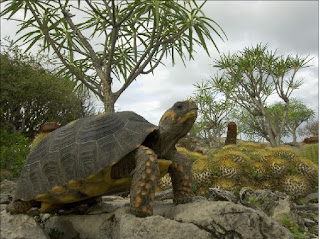The trouble with Christopher Columbus was that he liked to find places which he thought were India, but weren't, and plant a Spanish flag close on the beach, but close enough to his boat that he didn't get sand between his toes, and then leave again, aware that English pirates were sneaking up to loot any gold or silver he might have, but blindly oblivious to the French who were also sneaking up behind him, less interested in the gold and silver than in settling these new lands, tearing down the Spanish flag, and claiming them for France. It took them until 1648 to do this on Saint-Barthélemy, and then, deciding that cultivating cacao was all very well, but fighting the Taino was not, they sold the island to Sweden, who renamed the largest town Gustavia, after their King Gustav III, and made it a free port - well, that was the name they used, though it is unclear how a place can be, at one and the same time, a "free port" and a place which operates under an "Ordinance concerning the Police of Slaves and free Coloured People", even though it has no plantations. The last slave on the island was freed in 1847, which was fourteen years after the British, but still several decades ahead of most of the other Caribbean islands, let alone the Americas.
The island made a very comfortable living for the Swedes, less from the cacao than by providing a trade and supply center during the colonial wars of the 18th century; so successful, indeed, that France bought the island back in 1877, placing it under administration from nearby Guadeloupe.
So there you have it - a Taino-Spanish-French island, whose street and town names are Swedish, so that there should really be four and not three crowns on its coat of arms. In 2003 the populace of the island voted to secede from Guadeloupe, and in 2007 the island became a French overseas collectivity.

Marks for: 7, based on the significant contributions made to human civilisation by the Taino people. These are, in total, the addition of the words barbecue ("barbacoa"), hammock ("hamaca"), canoe ("kanoa"), tobacco ("tabaco"), yucca ("yuca"), potato ("batata"), and hurricane ("juracán") into European language and culture.
Marks against: 0, based on the significant contributions made to human civilisation by the French, Spanish and Swedish settlers of Saint-Barthélemy.
You can find David Prashker at:
http://theargamanpress.com/
http://davidprashker.com/
http://davidprashker.net/
https://www.facebook.com/TheArgamanPress
http://davidprashkersprivatecollection.blogspot.com
http://davidprashkerssongsandpoems.blogspot.com
http://davidprashkersbookofdays.blogspot.com/
http://davidprashkersartgallery.blogspot.com/
Copyright © 2015 David Prashker
All rights reserved
The Argaman Press

No comments:
Post a Comment